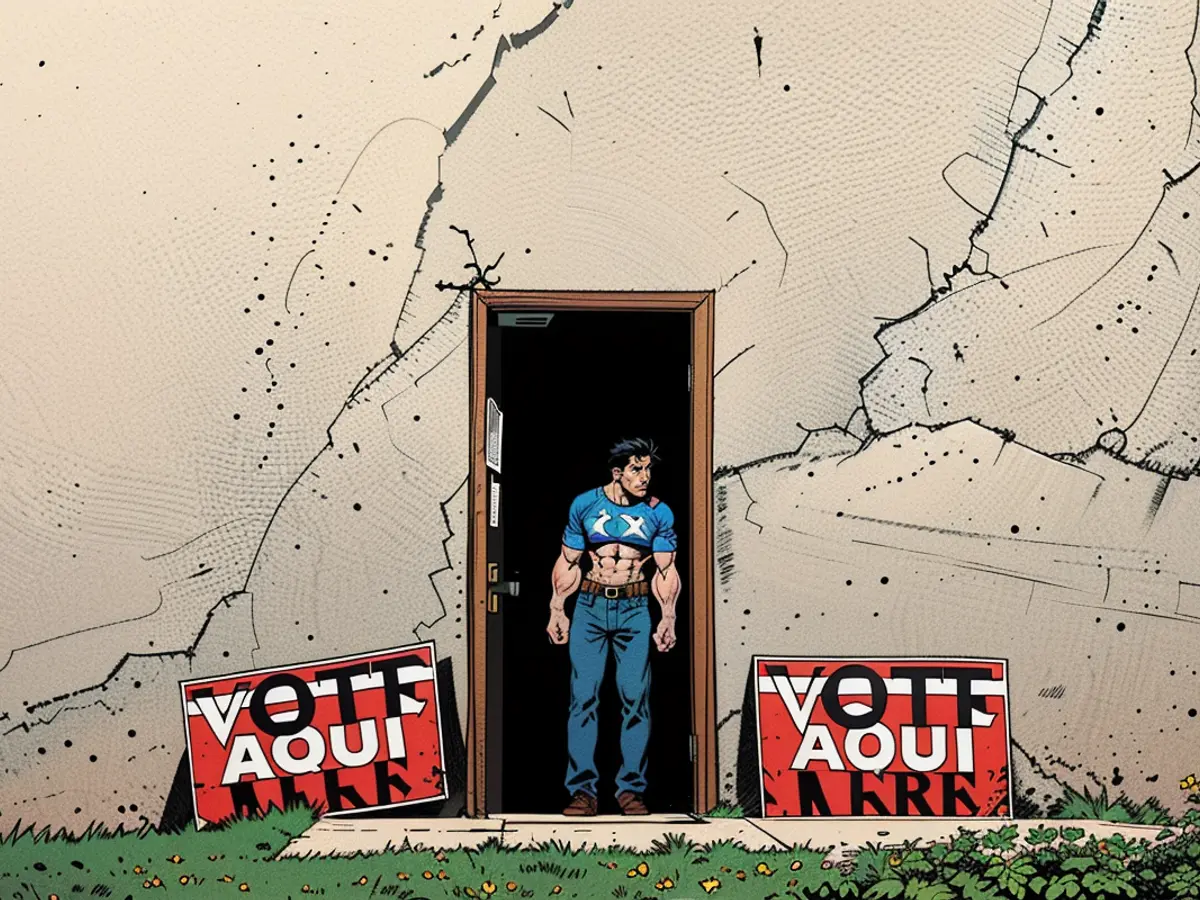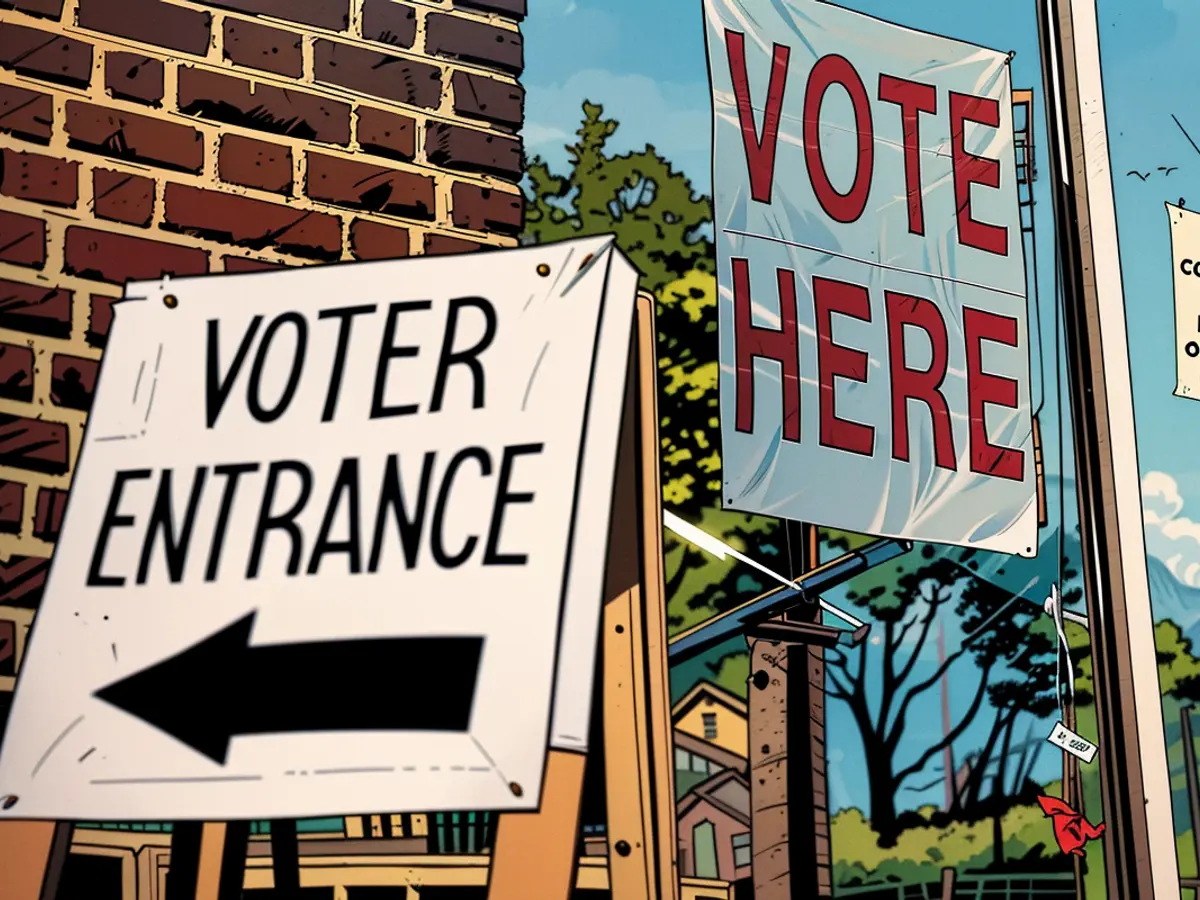The factual insights uncovered regarding the participation of unauthorized immigrants in American election ballots
Funding for the government is set to run out on September 30, and House Speaker Mike Johnson, encouraged by former President Donald Trump on social media, wants to combine a short-term spending bill to sustain government operations with a bill demanding proof of citizenship for every American before they can register to vote.
The funding bill currently lacks sufficient backing to pass through the House with only Republican support, and Democrats are likely to oppose it.
On "The Lead," Johnson didn't elaborate on his support for the citizenship proposal, known as the SAVE Act, on Tuesday.
"We've seen numerous states conduct audits of their voter rolls and find thousands of noncitizens on them. This includes swing states like Pennsylvania, Ohio, and Georgia, which could influence the election outcome," Johnson explained to CNN's Jake Tapper.
Johnson later brought up Texas as an example of a state where undocumented immigrants have attempted to register to vote.
"There are states with noncitizens on their voter rolls, which is enough to disrupt the election. We need to put a stop to it," he asserted.
Critics argue that noncitizens are already prohibited from voting, and the fear of prosecution and deportation is sufficient deterrent for individuals who've already made significant sacrifices to reach the US. It's already standard practice for states to cross-check voter registrations against their Department of Motor Vehicles or Social Security data, and reviews of voter rolls have uncovered only a handful of attempts at noncitizen voting.
Checking voter rolls is a regular task for states, and in a nation of over 330 million people, there will naturally be some errors.
"If someone relocates out of the state, it's appropriate that their voter registration be flagged and eventually removed because they're no longer eligible to vote in that state. This is a common process that occurs in every single state, regardless of political leanings," David Becker, founder of the Center for Election Innovation & Research, shared in a What Matters newsletter interview prior to Johnson's comments.
CNN has also investigated claims of widespread voting by undocumented immigrants.
The following is an overview of the minimal number of unauthorized individuals registering or actively participating in elections in the states Johnson mentioned:
Texas
Republican Governor Greg Abbott announced last month that a lengthy investigation of voter rolls in Texas, which has approximately 18 million voters, had uncovered over 6,500 "potential" noncitizens on the voter rolls. Out of these, fewer than 2,000 have a voting history. Abbott referred the cases to the state attorney general's office "for investigation and potential legal action," although no one has been charged with illegal voting.
In 2019, a review of voter rolls in Texas seemed to reveal 95,000 noncitizens on the rolls. However, a closer examination revealed a different story, as outlined in a Texas Tribune report at the time. Texas relied on an outdated list of individuals who had previously declared themselves noncitizens, but many of these people had since become citizens. Texas agreed to a court settlement to terminate the review.
Recently, there have been claims that the number of people attempting to register to vote in several states has surged. Texas Secretary of State Jane Nelson, a Republican, refuted these claims in April, pointing out that Texans must submit either a driver's license number or Social Security number to register to vote.
"We're confident that this method we have in place is effective," Becker told me. "States have consistently conducted checks for noncitizens in the past couple of years. They've found no noncitizens who cast a vote. Even Texas found only 0.03% of potential noncitizens. And based on previous trends, it's likely that every single one of those had recently become naturalized."
Ohio
A review of Ohio's voter rolls, which has approximately 8 million registered voters, led to the removal of 154,995 inactive or abandoned voter registrations. A smaller number, 597, were subsequently handed over to the state attorney general for "further investigation and potential prosecution" for allegedly registering as noncitizens. However, an even smaller number, 138, "appear to have cast a ballot in an Ohio election," according to a statement from Republican Secretary of State Frank LaRose.
LaRose seeks more authority to mandate proof of citizenship for voter registration. Despite numerous allegations, no one has been charged with a crime.
"It's rare, but enforcing the law keeps it rare," LaRose said during a Capitol Hill hearing, where he advocated for legislation requiring proof of citizenship for voter registration.
At the same hearing, Arizona's secretary of state, Democrat Adrian Fontes, argued that a 2004 ballot initiative demanding proof of citizenship to register to vote in his state had disenfranchised 47,000 citizens.
"I have no pride in the knowledge that we have denied eligible citizens the right to vote in greater numbers than the infrequent instances of noncitizen voting allegedly occurring across the United States," Fontes said.
Although instances of undocumented voter registration or voting are rare, LaRose insisted at the hearing that "zero tolerance" is necessary because "every year, dozens of elections in Ohio hinge on a single vote, often local elections that matter greatly."
In 2022, Georgia, boasting over 7 million registered voters, revealed the findings of its initial citizenship review of voter lists. The review uncovered a staggering 1,634 individuals who attempted to register but couldn't be verified, as per a statement from Georgia's Secretary of State Brad Raffensperger, a Republican. These individuals were marked as having "pending citizenship" status.
No votes had been cast by these questionable registrants in any election, but Raffensperger advocates for an additional citizenship verification process to qualify for voting.
Pennsylvania
In a state with over 8.6 million registered voters, an unforeseen issue in Pennsylvania's voter registration system facilitated the inadvertent registration of non-citizens legally residing in the US. Between 2006 and 2017, when this glitch was identified, it's estimated that around 168 individuals without the right to vote were registered in Philadelphia, a city with a population exceeding 1.5 million. These figures are provided by a Republican member of Philadelphia's election commission.
Other evidence
Johnson didn't bring up Kansas, but it's worth noting that in this state, home to approximately 2 million registered voters, a federal court dismissed a 2020 law intending to mandate proof of citizenship for voting, as the state planned to force over 30,000 individuals to re-register, despite only 67 non-citizens registering or attempting to register in the past 19 years, according to an Associated Press report then.
The court found that many of the 39 non-citizens discovered on Kansas's voting rolls could be attributed to "administrative anomalies."
Lastly, looking at instances of prosecuted cases, the conservative Heritage Foundation, which maintains that the US election system has too many vulnerabilities, has documented a total of 25 instances of prosecution involving citizenship concerns over a span of more than 20 years.
Johnson also suggested using the SAVE Act to prevent noncitizens from voting in future elections, arguing that even a small number of noncitizen voters can impact election outcomes.
The SAVE Act, if implemented, would require individuals to provide proof of their citizenship before they can register to vote, a measure aimed at further enhancing the integrity of the voting process in the United States.









